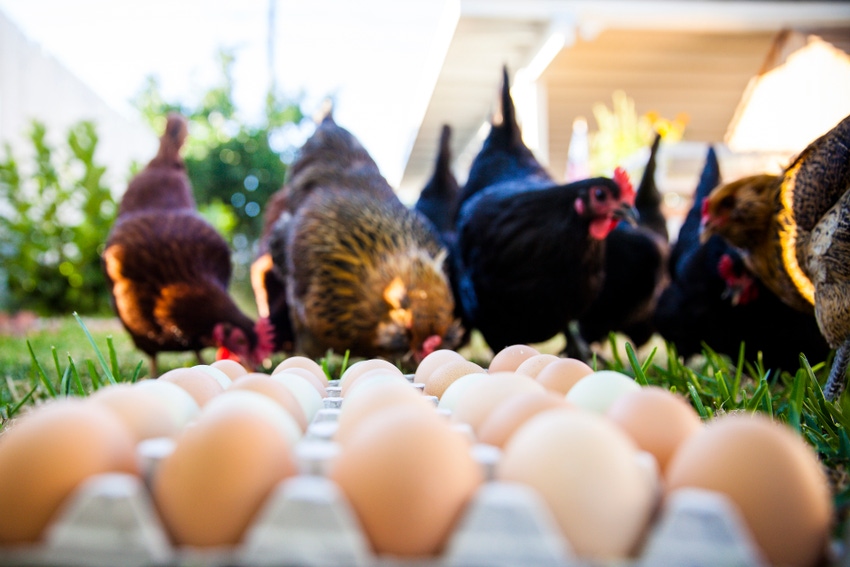
Nevada Gov. Steve Sisolak signed legislation June 8 that requires eggs sold in Nevada to be from cage-free facilities, no matter where the eggs were produced. It also bans the caging of egg-laying chickens in the state.
Nevada is the ninth U.S. state to ban cages for egg-laying hens, following Utah, Colorado, Michigan, Washington, Oregon, California, Massachusetts and Rhode Island.
According to the U.S. Department of Agriculture’s Agricultural Marketing Service, approximately 71% of U.S. hens must be in cage-free production by 2026 to meet projected demand from the retailers, foodservice providers and food manufacturers that have made promises to transition to cage-free eggs.
Nevada’s law also mandates enrichments which give hens the ability to engage in vital natural behavior like perching, scratching, dust bathing and laying eggs in a nest.
Related: Utah governor signs into law mandating cage-free eggs
Assemblyman Howard Watts, D-Las Vegas, chair of the Assembly Natural Resources Committee has introduced AB 399 putting “on the record that we want to make sure eggs sold here come from cage-free producers” says Watts. “It was actually something brought to me by both the Humane Society and an association of major egg producers,” Watts was reported as saying. “They recognize and support the egg industry moving in this direction.”
“This is a transformational win for chickens. No animals—including farm animals—deserve to be confined in cages so tiny they can barely move,” says Josh Balk, vice president of farm animal protection for the Humane Society of the United States. “I’m grateful for Assemblyman Howard Watts for sponsoring the bill and speaking out so passionately for its passage. And I’m thankful for Gov. Sisolak signing this bi-partisan legislation into law, guaranteeing millions of chickens will never have to suffer in a cage.”
Ken Klippen, president of the National Egg Farmers, says he is “disgusted” that a major egg association joined with the HSUS in pushing a cage-free bill in the Nevada legislature.
“Obviously, this lawmaker chose not to get all the facts from other egg farmers and the major association representing them,” Klippen says. The National Egg Farmers organization has repeatedly warned of the animal welfare as well as environmental concerns that actually result in a cage-free system.
In comparing environmental emissions from caged systems compared to cage-free, caged systems are better for the environment with ammonia and particulate matter (PM 2.5 and PM10). Klippen shares that research has shown that manure belt conventional cages had a mean average for ammonia for all the collections taken at 0.00012 lb./hen/day compared to aviary (cage-free) at 0.00049 lb./hen/day (4 times more ammonia in cage-free compared to conventional manure belt removal). PM2.5 for conventional manure belt systems was 2.8 mg/hen/day compared to cage-free aviary at 12.3 (more than 4 times more particulate matter in cage-free) and PM10 for conventional manure belt systems was 20.3 mg/hen/hen compared to 124.4 for cage-free (more than 6 times of particulate matter for cage-free production).
“The point is, when sustainability experts claim egg production is contributing to climate change, our conventional cage system shows why poultrymen have opted for putting chickens in cages,” Klippen says.
When the HSUS began its cage-free campaign in 2005, only a small number of egg industry hens lived in cage-free environments. Now, that figure is just over 30%. HSUS claims it has “waged successful campaigns to persuade more than 200 of the country’s largest food companies to adopt cage-free policies.”
Kitty Block, president and CEO of the Humane Society of the United States, in her latest blog post notes, “We are thrilled about today’s bill passage, and excited that it represents another step in the momentum for a cage-free future. We’re celebrating Nevada’s new law as we vow to keep pressing for legislation and corporate policies to ban the extreme confinement of farm animals.”
Read more about:
EggsAbout the Author(s)
You May Also Like






